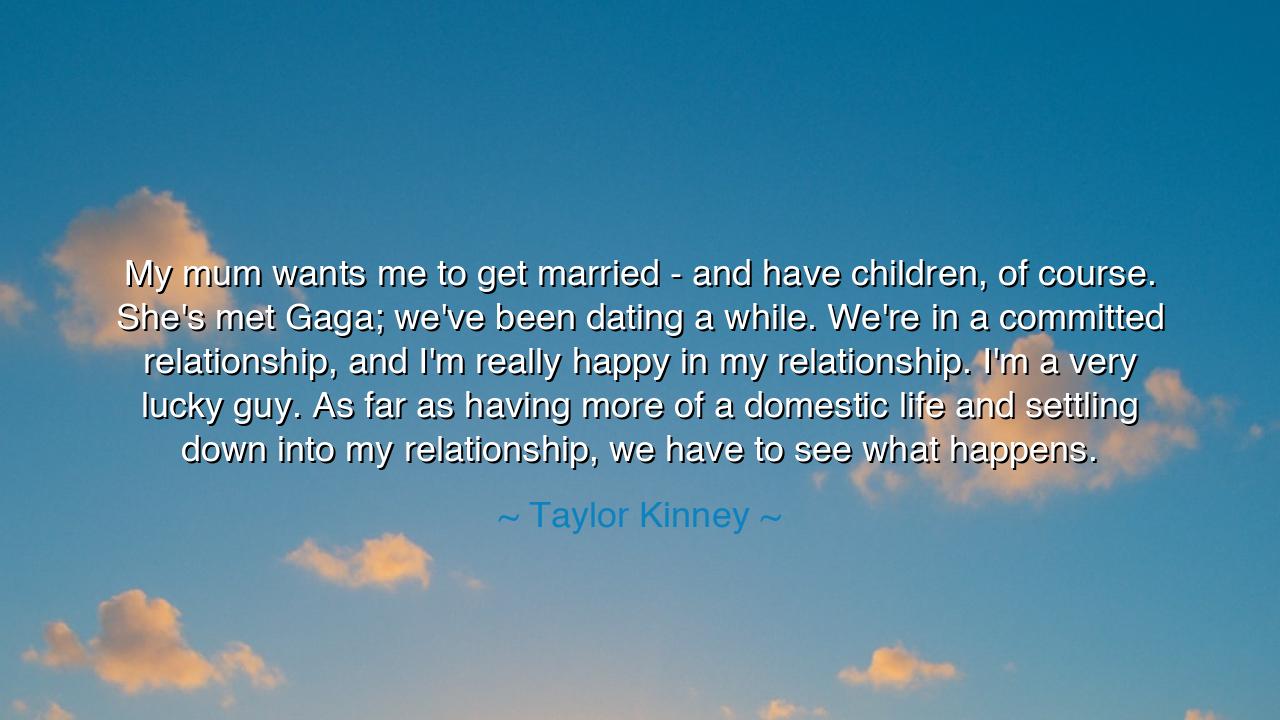
My mum wants me to get married - and have children, of course.
My mum wants me to get married - and have children, of course. She's met Gaga; we've been dating a while. We're in a committed relationship, and I'm really happy in my relationship. I'm a very lucky guy. As far as having more of a domestic life and settling down into my relationship, we have to see what happens.






The words of Taylor Kinney—“My mum wants me to get married—and have children, of course. She’s met Gaga; we’ve been dating a while. We’re in a committed relationship, and I’m really happy in my relationship. I’m a very lucky guy. As far as having more of a domestic life and settling down into my relationship, we have to see what happens”—speak with humility, gratitude, and the quiet wisdom of a man aware that life’s deepest joys cannot be forced into a schedule. Though spoken in the language of our age, they carry the timeless message of the ancients: that love, though it invites commitment and calls toward the hearth, must unfold in its own rhythm, guided by patience and mutual growth.
When Kinney speaks of his mother’s wishes—her hope for marriage and children—he touches upon an age-old tension between expectation and destiny. For across all generations, parents have dreamed of seeing their children settled, their lineage secure, and their hearts at rest. It is the instinct of love that desires continuity. Yet, as Kinney gently reminds, life cannot be shaped by another’s will, no matter how loving that will may be. “We have to see what happens,” he says, a phrase that carries both reverence for fate and acceptance of uncertainty. In these words lies an ancient truth: life is not to be mastered, but to be trusted.
His reflection upon his relationship reveals not only devotion but also mindfulness. “I’m really happy in my relationship,” he says, and this happiness is not the fiery passion of new love, but the grounded joy of companionship. The ancients taught that love is strongest when it is rooted in contentment, when each partner feels not ownership but gratitude. To call oneself “a lucky guy” is to speak from humility—to acknowledge that love is not a conquest or a reward, but a gift. In his tone there is neither pride nor presumption, but balance: he stands between the fervor of youth and the calm wisdom of maturity, where happiness is measured not by possession but by peace.
There is a lesson here that echoes through history. Consider Marcus Aurelius, emperor and philosopher, who wrote in his Meditations of the importance of aligning one’s desires with the unfolding of life. He too knew that even power cannot control the course of love, fate, or family. What matters, he taught, is serenity in uncertainty—the ability to rejoice in what is, while being open to what may come. Kinney’s statement reflects that same spirit: a refusal to rush what should ripen naturally, a quiet faith that love, when true, will find its own next step.
The mention of Lady Gaga, his partner, brings an additional layer of meaning. In their relationship, two worlds met: the grounded, private man and the luminous, public artist. To navigate such a bond requires patience, resilience, and deep trust. The ancient poets would have seen this as a union of elements—earth and fire, steadiness and brilliance. When Kinney says, “we have to see what happens,” he acknowledges that love between strong souls must evolve freely, for to confine it too quickly is to risk extinguishing its spark. Real love, the ancients would say, is a river—it must flow, not be dammed by haste or fear.
His words also speak to the eternal longing for domestic life, that sacred rhythm of home, warmth, and belonging. Yet even here, he is wise enough to wait. “As far as settling down,” he says, “we have to see what happens.” To many, this might sound uncertain, but to the wise, it is the language of faith. He recognizes that commitment is not merely a promise spoken, but a state of readiness. The heart must be prepared not only to love, but to sustain love—to turn passion into partnership, and excitement into endurance. Such readiness cannot be rushed; it is cultivated through time, patience, and shared experience.
So, what lesson may we draw from his words? It is this: do not hurry the seasons of the heart. Love that is real will not fade if given time; love that is fragile will not endure even if rushed. To live wisely in love is to balance action with surrender—to cherish the present joy, while trusting the unknown future. Do not allow the pressures of family, society, or fear to dictate the pace of your heart. Marriage, children, home—all these are sacred milestones, but they must be born of readiness, not expectation.
Therefore, my children, learn from Taylor Kinney’s quiet wisdom. Be grateful for love, but do not cling to its outcomes. Celebrate what you have without demanding what must come next. For love is not a ladder to climb, but a path to walk—sometimes bright, sometimes uncertain, but always meaningful. And when the world urges you to hurry, remember his words: “We have to see what happens.” In that patience lies peace, and in that peace, the truest kind of love.






AAdministratorAdministrator
Welcome, honored guests. Please leave a comment, we will respond soon